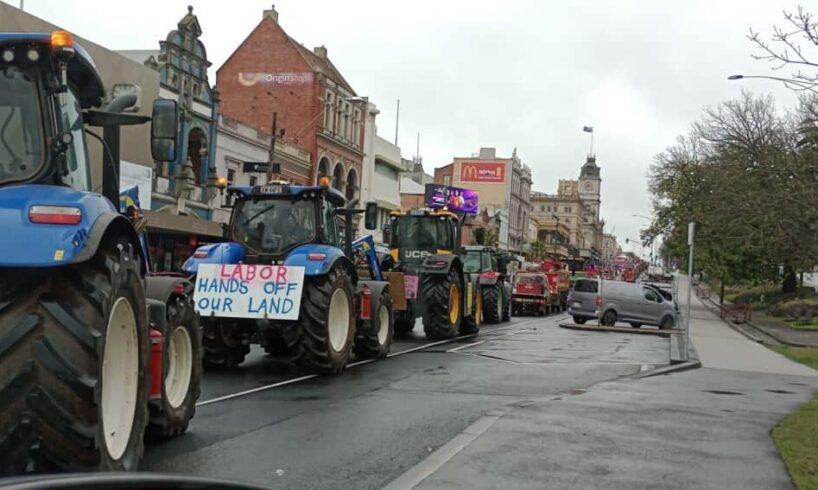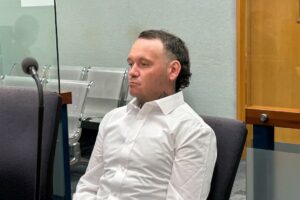
Prime Minister Anthony Albanese may not have expected a wholly positive reception at the Bush Summit in Ballarat, country Victoria, today, but it’s unlikely he expected having his motorcade chased by tractors. Likewise, Victorian Premier Jacinta Allan may not have expected to find herself blocked from leaving the summit venue by both tractors and Country Fire Authority (CFA) fire trucks.Footage posted by the Herald Sun newspaper shows the prime minister’s white motorcade being followed closely by fast-moving tractors.SBS News has contacted the prime minister and premier’s office for comment but has not yet received a reply.Both Labor leaders would be aware of the opposition to renewable energy infrastructure that’s been simmering in rural areas around Ballarat for several years.They would also be aware of the hostility directed towards Victoria’s emergency services levy, which some in regional communities believe unfairly burdens them with the cost of funding services such as the CFA.
Protests against these issues have seen large convoys of fire engines and tractors take to the streets of Melbourne and smaller cities of Victoria in recent years.
Several Country Fire Authority fire trucks were driven in to Melbourne to protest the state Labor government’s emergency services levy on 20 May. Source: AAP / James Ross
‘This is these people’s castles’
In the fertile potato-growing areas around Ballarat, the opposition to renewable energy infrastructure is primarily directed against the Western Renewables Link, an electricity transmission line that will run from wind farms in Victoria’s west to Melbourne’s outer suburbs.At just 190 kilometres, the high-voltage power line makes up only a fraction of the approximately 10,000 kilometres of new transmission lines that Australia may need to build to decarbonise our electricity grid by 2050.Construction on the project was originally slated to start in mid-2025 but has now been delayed until after the 2026 state election, something the state opposition has said is a deliberate ploy by Labor to hang on to its seats along the project’s path.
Transmission company Ausnet has attributed the delay to changes made to the project’s route and design, which involved “extensive updates including engineering design, planning and community consultation,” a spokesperson said, as reported by The Weekly Times in April.
Local farmer Will Elsworth says the ‘Piss Off Ausnet’ hill — first created by another local farmer several years ago — is now “the most recognised landmark in the Hepburn Shire”. Source: Supplied / Will Elsworth
At the Bush Summit, a member of the public asked Albanese: “Why are regional communities paying the cost for renewable energy? Where is the social licence? Where is the regulation to protect our communities, value our farmland and preserve our environment?”Albanese, who was repeatedly booed by some regional landowners in the summit’s audience, said: “Quite clearly, governments haven’t done well enough in the engagement and community consultation and those processes.”Albanese said he’d had conversations with locals about “their experience of just getting hit with information from an energy company without any notice”, which he described as “completely unacceptable”.Allan also said that engagement with landowners over such projects had “not been acceptable”.”Whether it’s the support that landowners receive in hosting transmission lines on their property, whether it’s the compensation arrangements that are being made available … we can work through these issues together,” the Herald Sun reported the premier as saying.
The Victorian government has committed to pay landowners $8,000 a year for every kilometre of transmission infrastructure for 25 years.
However, Will Elsworth, a farmer who attended Friday’s protests, said increasing the rate of compensation wasn’t a solution.”They’ve offered people millions of dollars and they will not let them in because these people have, I don’t know if the word’s right, an intrinsic value to their land,” he told SBS News.”It’s like [1997 Australian movie] The Castle. There was no money with the bloke in The Castle. He didn’t want to be bought out because his family’s home is his castle, and this is these people’s castles. Money’s not the issue.”She’s trying to roll these renewables and transmission lines across the most productive farmland in Australia,” Elsworth said, referring to Allan.Speaking of the premier’s delayed exit from the summit, Elsworth said: “So she’s decided to leave, and then they’ve actually blocked the road’s exit with people, and then they’ve blocked it with tractors. Then they’ve blocked it with fire trucks. “So you couldn’t get out. It didn’t matter if you moved the tractor, you couldn’t move the firetruck.”
Elsworth said he wasn’t familiar with the moment in which the prime minister’s motorcade was reportedly chased by tractors.
Discontent ‘urgently needs to be addressed’
The Victorian government has recently passed legislation granting state government agency VicGrid powers to access private farmland to build transmission towers.The laws, which passed Victoria’s upper house earlier this week, give authorised officers the power to use “reasonable force” to enter properties. Those who obstruct, hinder or delay access to such officers face fines of several thousand dollars.The news was met with fury by some farmers, who told the ABC they would continue to refuse access to those involved in transmission line projects.
Victorian Farmers Federation president Brett Hosking said the laws would only “create more discontent, distrust and disharmony in the community, and the opposition will last longer, be stronger, and the transition’s going to take a whole lot longer”.
However, there’s evidence suggesting opposition to renewable energy infrastructure isn’t necessarily a dominant sentiment outside of Australia’s cities. A 2024 poll commissioned by Farmers for Climate Action found that 70 per cent of respondents supported clean energy projects on farmland in their community, while only 17 were opposed. Polling in the same year commissioned by the Renewable Energy Alliance (RE-Alliance) found over 60 per cent of those in regional areas support government investment in large scale renewable infrastructure in regional Australia.
However, in a recent submission to government, Re-Alliance policy and engagement manager Tony Goodfellow argued that this support was fragile and “growing discontent that urgently needs to be addressed”.
Emergency services levy
Friday’s protests in Ballarat were also motivated by Victoria’s Emergency Services and Volunteers Levy, a local tax hike to support the provision of various emergency services.The levy, which passed state parliament earlier this year and will come into effect next year, is projected to increase the amounts paid by property owners relative to the tax scheme it replaces.
Councils are tasked with collecting the new levy — a responsibility that some have not warmly embraced.
Hepburn Shire Council, which takes in areas around Ballarat, passed a motion earlier this year “confirming Council’s strong opposition to the Emergency Services and Volunteers Levy”. “Council has previously written to the Treasurer and Minister for Local Government expressing that the levy has a disproportionate financial burden on rural and regional communities, like ours, especially primary producers,” the council wrote. In response to criticism, the state government has offered a one-year temporary exemption to primary producers.— With additional reporting from Australian Associated Press
Source





